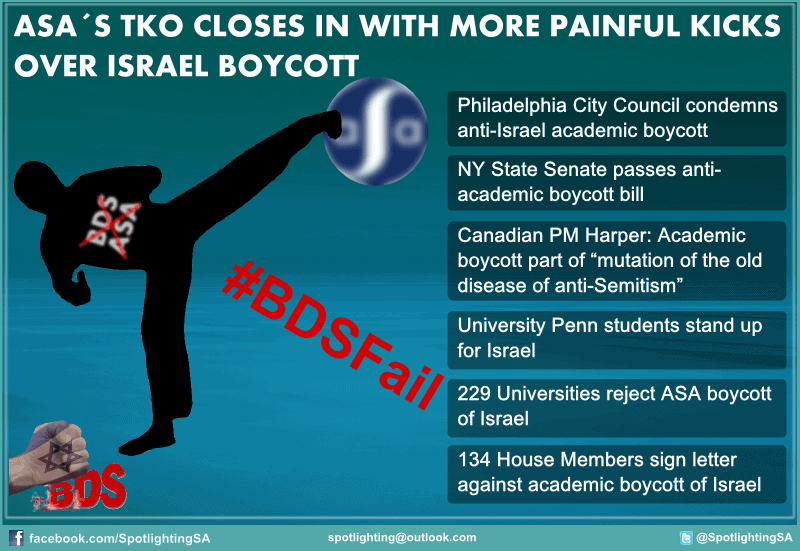Everything you need to know about fighting BDS and the assault on Israel’s legitimacy. Find us on Facebook here.
Today’s Top BDS Stories:
 1. SodaStream workers speak out. Christian Science Monitor went to the SodaStream factory in Ma’ale Adumim to see if Palestinian workers are really as well-treated as SodaStream says.
1. SodaStream workers speak out. Christian Science Monitor went to the SodaStream factory in Ma’ale Adumim to see if Palestinian workers are really as well-treated as SodaStream says.
Those most familiar with the factory – Palestinians who work there – largely side with Ms. Johansson.
“Before boycotting, they should think of the workers who are going to suffer,” says a young man shivering in the pre-dawn darkness in Azzariah, a West Bank town cut off from work opportunities in Jerusalem by the concrete Israeli separation wall. Previously, he earned 20 shekels ($6) a day plucking and cleaning chickens; now he makes nearly 10 times that at SodaStream, which also provides transportation, breakfast, and lunch.
2. Battle over Israel boycotts reaches high levels of diplomacy.
State House extols John Kerry’s “support for Israel’s security and well-being, including staunch opposition to boycotts” after Israeli leaders took exception to an earlier statement from Kerry warning of an “increasing de-legitimization campaign that has been building up” if Israel does not reach a peace agreement with the Palestinians. “People are very sensitive to it,” Kerry said. “There are talk of boycotts and other kinds of things.”
Benjamin Netanyahu spoke out against Kerry’s apparent threat of boycotts:
“The attempts to boycott the State of Israel are immoral and unjustified,” Netanyahu said. “Aside from this, they will not accomplish their goal. First of all, they entrench the Palestinians deeper in their positions, pushing peace farther away; and second, no pressure will force me to give up the vital interests of the State of Israel, above all the security of the citizens of Israel.”
The Israeli Foreign Ministry rejected claims from the Strategic Affairs Ministry that there are tools in place capable of dealing with boycotts from large European bodies.
Israeli diplomats in embassies in Europe have identified a negative trend that is on the rise, and a tendency to present a caring front towards Palestinians. “There are companies that decide to boycott Israeli companies because they want to be part of this wave,” a Foreign Ministry source said. “In fact, it is almost impossible to do anything against it.”
Meanwhile, the Norwegian Ministry of Finance dropped to Israeli companies from its pension funds because of ties to the West Bank, and Sweden’s Nordea Bank and Denmark’s Danske Bank have put in sanctions against Israeli banks, including Bank Hapoalim, for “legal and ethical” reasons.
3. Roger Waters, the high priest of culture boycotts against Israel, is miffed at Scarlett Johansson and Neil Young for not falling in line with Waters’ view on BDS. Israellycool has the response.
Other Notable BDS Stories:
* Alex Margolin from HonestReporting notes that Scarlett/SodaStream used the BDS’s own tactics against the movement. By the end, it was reasonable to conclude that SodaStream does more for the Palestinians than the BDS.
* Israeli journalist Hirsh Goodman takes to the pages of the New York Times to point out that Israel is losing the propaganda war:
As anyone who has bought a “Gucci” bag in a Bangkok market can tell you, it’s all in the label. And the apartheid label is beginning to stick — fair or not. It carries with it huge consequences for Israel, which the country’s inward-looking leaders seem impervious to. They have yet to understand that on this new battlefield, tanks don’t count and the use of force, sure to be televised, plays into the hands of the enemy. It’s a war Israel cannot win unless it makes peace.
* Algemeiner has a long interview with Anne Herzberg, the legal advisor for NGO Monitor, about Oxfam.
“Oxfam’s humanitarian mission is to improve the economic situation of Palestinians, so why they wouldn’t be in favor of employment for Palestinians is pretty surprising. If this organization wants to have a stronger reputation why would it align itself with these extreme activists who are so outside the mainstream?”
“I can understand it from Scarlett Johansson’s perspective, there are different ways to frame the conflict and people can disagree. But Oxfam not willing to stand up for her, and to not be associated with them [BDS] anymore, not willing to take a stand against the BDS movement, after their organization’s history, is surprising.”
Trevor Neilson, co-founder of Global Philanthropy Group, said Oxfam’s statement that Johansson is “incompatible” with its values may deter A-list celebrities from getting involved in charity work.
Mr Nielson thinks the charity could now struggle to recruit celebrities, saying that it is “unrealistic” for any charity to expect celebrity supporters to agree with it on everything. “It’s not as if Johansson was working with Oxfam on the West Bank issue; she was working with them on extreme poverty. Do you have to agree with an NGO on all issues in the world in order to work with it on one issue?” he added.
* BDS founder Omar Barghouti gets op-ed space in the New York Times to publish what is essentially an advertorial for BDS. Not surprisingly, he’s silent about the fiasco with Oxfam/Scarlett Johanssen and the massive backlash to the ASA.
* New York overwhelmingly passes law banning state funds to colleges engaged in academic boycott against Israel.
See last week’s Fighting BDS Roundup.


